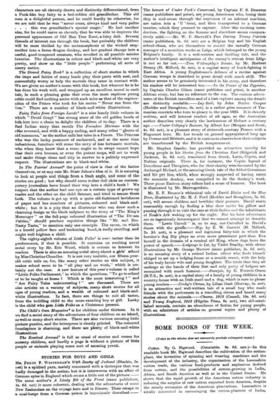STORIES FOR BOYS AND GIRLS.
MB. 1"zn crY F. WESTERMAN'S With Beatty off Jutland (Blackie, 5s. net) is a spirited yarn, mainly concerned with a destroyer that was badly damaged in the action, but it is interwoven with an affair of German spies in England which seems a little out of the picture.— The same author's A Lively Bit of the Front (same publishers, 4s. 6d. net) is more coherent, dealing with the adventures of some New Zealanders on the voyage here and in France. Their escape in a coal-barge from a German prison is ineeniouslv described.— The heroes of Under Foch's Command, by Captain F. S. Brereton (same publishers and price), are young Americans who, losing their
ship in mid-ocean through the explosion of an infernal machine, are taken into a U '-boat, and then transported to a German trawler, which they proceed to capture. After this exciting intro- duction, the fighting on the Somme and elsewhere seems compara- tively mild.—Mr. W. P. Shervill's Two Daring Young Patriots (same publishers, 3s. 6d. net) are a Belgian boy and his English school-chum, who set themselves to outwit the rascally German manager of a munition works at Liege, which belonged to the young Belgian's family. It is a well-written and thrilling tale, and the author's intelligent anticipation of the enemy's retreat from IAtige
Is not so far out.—Tom Willoughlty's Scouts, by Mr. Herbert
Strang (H. Milford, 5s. net), is a capital story of bus h-fighting it East Africa. A young Englishman's defence of a ravine against German troops is described in groat detail with much skill. The author seems to be genuinely interested in his story, and therefore his readers will be interested too.—In the Power of the Pygmies, by Captain Charles Gilson (same publisher and price), is another African story, but has no reference to the war. The curious adven- tures of the British travellers and of a lost explorer among the dwarfs
are distinctly readable.—Leg-Bail, by John Butler Cooper
(Hodder and Stoughton, Os. net), is a rather grim romance of Tea. manian convicts who turn to piracy in the year 1825. It is cleverly written, and will interest readers of all ages, as the Australian author describes very clearly the lawlessness of Hobart a century ago.--Under Coligny's Banner, by Albert Lee (Morgan and Scott,
4s. 6d. net), is a pleasant story of sixteenth-century France with a Huguenot hero. Mr. Lee treads on ground appropriated long ago by Dumas and Merimee, and it is curious to observe how their subjects are transformed by the British temperament.
Mr. Stephen Gaselea has provided an attractive novelty for young people in his Stories from the Christian East (Sidgwick and Jackson, 3s. 6d. net), translated from Greek, Latin, Coptic, and Nubian originals. There is, for instance, the Coptic legend of Dorotheos and Theopiste, who for their charity were favoured by the
Archangel Michael, or the amusing Greek tale of the Abbot Gerasimus and his pot lion, which, when wrongly suspected of having eaten the monastic donkey, was compelled to do the donkey's work. These pious Eastern story-tellers had a sense of humour. The book is illustrated by Mr. Mavrogorde.to.
Mr. E. F. Benson's whimsical tale of David Blaize and the Blue Door, illustrated by Mr. H. J. Ford (Hodder and Stoughton, 7s. 6d.
net), will amuse children and bewilder their parents. David starts reasonably enough by finding a blue door under his pillow and passing through it to visit the oats at their frolics and the inhabitants of Noah's Ark waking up for the night. But his later adventures are so ingeniously inconsequent that we cannot attempt to describe them. "Lewis Carroll" is, so to say, out-Carrolled in David's dance with the girafte.—Rip, by E. W. Garrett (H. Milford, 2s. 3d. not), is a pleasant and ingenious fairy-tale in which the heroine's dog Rip plays an even more prominent part than Eva herself in the domain of a comical old King, where dogs have the power of speech.—Lodgings to Let, by Violet Bradby, with clever illustrations by Mr. George Morrow (same publisher, 3s. Od. net), is an amusing story of a retired Indian officer who finds himself obliged to set up a lodging-house at a seaside resort, with the help of his truly heroic wife and young daughter. The trials that they all undergo at the hands of their first and only party of lodgers are recounted with much humour.—Sweepie, by E. Everett-Green (R.T.S., 3s. net), is a capital story of a family of young children in a
country-house with an Irish maid and a dog, which is sure to please young readers.—Dinky's Circus, by Lilian Gask (Harrap, 58. net),
Is an attractive and well-written tale of a small boy who made friends with the performers in a travelling circus and heard many stories about the animals.--Chume, 1918 (Cassell, 10s. 6d. net) and Young England, 1018 (Pilgrim Press, Os. net), two old-estab- lished annuals, contain an abundance of fiction for young people, with an admixture of articles on general topics and plenty of Illustrations.






































 Previous page
Previous page